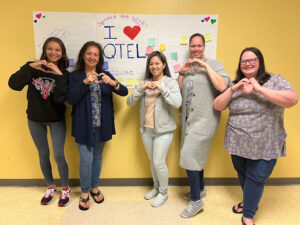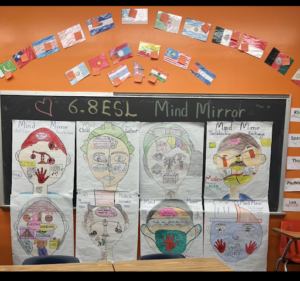District Teachers Prepare to Support English Learners

As the population of English Learners dramatically increases throughout the country, the School District of Philadelphia is preparing teachers to best support the diverse needs of its students. Nearly 240 District teachers who work with English Learners (ELs) recently finished their work with WestEd’s Quality Teaching for English Learners (QTEL), a unique research-based professional learning experience that enhances instruction for English Learners. 
Led by the School District of Philadelphia’s Office of Multilingual Curriculum and Programs (OMCP), QTEL provides teachers who work with English Learners student-centered, rigorous, grade-appropriate instruction, as well as best practices and strategies to support high quality education for their students. This professional learning experience began with Building the Base Summer Institute at Fels High School at the end of June and will continue through March 2024.
“The District’s population of English learners has grown [significantly over] the past five years,” said Benaline Baluyot, Director for the Office of Multilingual Curriculum and Programs. “Research has found that what is good for English Learners is good for all students, but what is adequate for a general population of students may not meet the needs of ELs. Ensuring that our teachers are adequately prepared to work with ELs is a crucial step towards education equity.”
During this training, teachers have the opportunity to meet with representatives of immigrant-serving community-based organizations to learn about support for immigrant students and families. Teachers also met with representatives from universities with tuition agreements to explore certification and program options.
“QTEL changed the way I think about engagement in my classroom,” said John Khun, a teacher at John Bartram High School, adding that he’s borrowed their refrains and made them their own. “Learning is primarily a social activity — we learn by talking with each other in sustained ways. When I’m at my best, I’m facilitating lessons where students are talking to each other about texts, sharing knowledge and experience in order to deepen it. I wouldn’t have a model for how to do this without QTEL training.”
 This is the sixth year for the Base Summer Institute and the first year that District teachers and staff serve as facilitators. Sixteen District educators and staff are participating in two-year QTEL apprenticeships to become local facilitators of QTEL professional learning, empowering the District to provide specialized professional learning.
This is the sixth year for the Base Summer Institute and the first year that District teachers and staff serve as facilitators. Sixteen District educators and staff are participating in two-year QTEL apprenticeships to become local facilitators of QTEL professional learning, empowering the District to provide specialized professional learning.
“QTEL has completely changed the way I approach teaching in general, not just math classes with ELs,” said Christina Kelly, a teacher at Lincoln High School. “Students are interacting with each other, participating in partner and group work. Far more students are engaged because it is more interesting to them. The structured tasks provide ways for students to interact, especially in mixed language groups, which enables them to learn language and content.”
“My participation in the QTEL program pushed me to more deeply consider the academic rigor that I want for my ELs,” said Carmen Paternoster, a teacher at Key Elementary School. “QTEL practices gave me strategies in the best ways to facilitate scaffolding for my students so that they can access grade-level material and achieve at a level that does not shortchange their abilities.”
Teachers apply to be part of this experience, which aims to accelerate language development, academic literacy, and disciplinary knowledge of all students, particularly English Learners. Last year, the District opened up this experience to teachers from all grades and content areas for the first time. A new cohort of teachers goes through the institute annually – four hundred and twenty-four teachers applied for 240 openings this school year.
The District currently has more than 20,000 English Learners who speak 112 different home languages. During the 2014-15 school year, the District had approximately 12,500 English Learners. This past February, the City of Philadelphia earned its Certified Welcoming Designation. This formal designation recognizes cities that have created policies and programs reflecting their values and commitment to immigrant inclusion, including the work that is taking place within education programs throughout the City.
